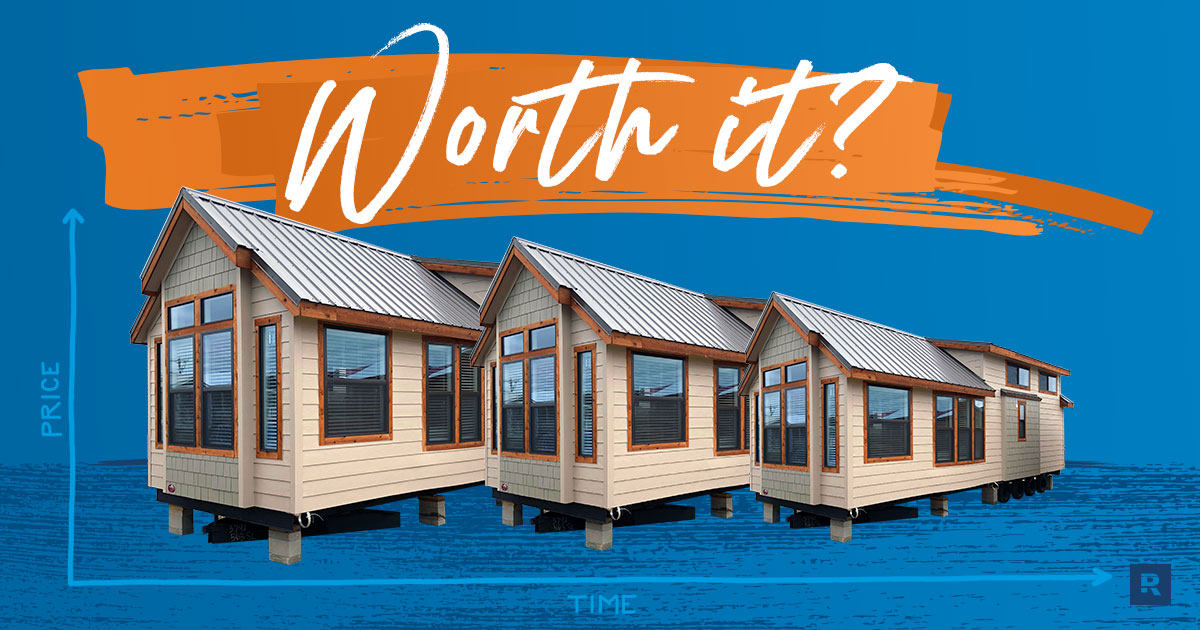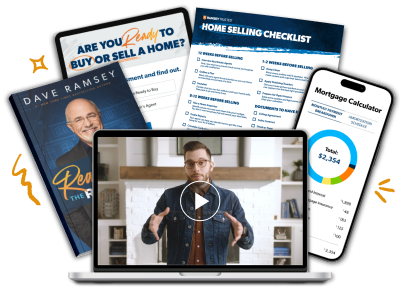
Remember when tiny houses were all the rage? Wait . . . they still are. People everywhere (especially millennials and older baby boomers) seem to be fascinated by the idea of downsizing their lives, responsibilities, debt and reliance on a normal nine-to-five. In the pop culture, there are TV series like Netflix’s Tiny House Nation and HGTV’s Tiny House, Big Living highlighting this supposed lifestyle of minimalism and nonstop adventure.
But is going tiny really worth it?
What Are Tiny Houses?
Tiny homes are homes that are . . . well, tiny. They can come in all shapes and sizes and can be built from a kit or from the ground up. Some are even customized RVs, school buses, trailers or shipping containers. But remember, tiny homes are small. The average size of these houses is around 225 square feet, but there are some that go up to 600 square feet.1
Tiny homes aren’t a new idea. People have lived in small spaces for all kinds of reasons since the beginning of time. But the tiny house movement you see today is here and going strong. Whether you consider yourself a minimalist or someone who just doesn’t like a lot of stuff, the idea of downsizing to a tiny home can easily grab your imagination.
Listen: You either love the idea of a tiny home or you hate it. If you’re young, have a wandering spirit, and just want a little adventure in your life without being attached to a hefty mortgage, you probably love the idea. And if the idea of not being able to sit up in bed makes you claustrophobic, you’ll hate it.
Your All-in-One Real Estate Resource
Find everything you need to help make confident decisions and reach your home goals.
How Much Does a Tiny House Cost to Build?
It depends. If you want your tiny home to be unique and customized to your lifestyle, you’ll have to get some help. And unless you know how to build a tiny house yourself, that help comes with a pretty high price tag. But if you don’t mind turning a rectangle box into a home, then a tiny house kit could be right up your alley.
Just like with any home, you get what you pay for. And the cost? It all depends on what you’re paying for. HomeAdvisor has the median price of a tiny home coming in at $45,000.2 In comparison, the median price for a full-size home in the United States is just over $392,450.3 But most tiny houses start at around $28,000 and can go upward of $150,000 or more, depending on what state you live in.4
Why Are Tiny Houses So Expensive?
Many tiny houses are expensive because they’ve been customized and personalized to every whim and whimsy of the homeowner. So, if you want your tiny house to have an outdoor theater, rooftop patio, butcher block countertops and a granite-tiled rain shower . . . you’ll pay top dollar. Not only that, but if you want to make the most of your space (and you do), you’ll want to build your house to be multifunctional. Maybe the bookcase doubles as the stairs you climb to get to your loft (make sure those books in there are locked down!). Or maybe the wall conveniently pulls out into a desk space for all your work-from-home needs (watch your head!). The possibilities are endless.
Find expert agents to help you buy your home.
But if you’re looking for a run-of-the-mill tiny space that gives you a place to rest your head (and save money on a mortgage), a tiny home kit could help. But remember, the kit doesn’t always include necessities like doors or windows. Yup—those are extra.
What many owners of tiny homes don’t realize is that there’s more to the cost than just the building process and materials (which aren’t exactly cheap right now—thanks, inflation!). They change drastically depending on your choice of foundation. Remember, you have to think about where you’re going to build (or park) your home and how much it costs to buy or rent a lot of land. Not to mention, you’ve got to include the cost of permits and licenses from the state and city where you’ll be parked (you can’t just drop it wherever!). Oh, and did we mention you’ll also need a trailer for traveling or moving your home, fuel, and a vehicle with enough horsepower to lug it around?
What’s the Resale Value of Tiny Houses?
Many people who own tiny homes see them as a way to own a home without having to pay out the wazoo for a mortgage. Not only that, but they also consider it to be a better purchase than renting someone else’s home or an apartment.
While those possibilities definitely set tiny house living apart from traditional homeownership, tiny houses also differ from regular homes in that they don’t appreciate in value over the years. Surprised? Don’t be. If your tiny home is built on wheels, then you can bet it’ll depreciate at the same rate as an RV or a truck.
With that in mind, selling your tiny house might be hard—especially since you’d have to find a super specific buyer and you’d have to sell that buyer on the customizations and style of house you chose for yourself. The multipurpose spaces you thought were a no-brainer for your lifestyle may not work for someone else’s lifestyle. Yup—that special closet you made for your handbell collection will be worthless to anyone who doesn’t give a rip about tiny musical bells.
In a nutshell, resale value for tiny homes isn’t that great. If you spent a chunk of money personalizing your tiny house, consider it a family heirloom once you outgrow your tiny house lifestyle. Maybe it becomes an office, an in-law guest room (boundaries are good things) or a future getaway spot for your family. But if you’re hoping to make your investment back plus extra . . . keep dreaming.
Do Tiny Houses Depreciate in Value?
They sure do. Like we said before, the market for tiny homes is a lot smaller than the market for full-size family homes. If your tiny home is built to sit on wheels, it’ll depreciate in value just like the truck you pull it with. But even if your tiny house is built on a foundation, it still won’t increase much in value, because the value is determined by the demand in the marketplace.
So, unless you’ve built your tiny house on the most desirable piece of land in the United States (and you own that land) with a crazy amazing view, you’re probably not going to be seeing your home value go up over the years. Bummer.
But when it comes to owning a tiny home, people aren’t really looking to build equity. They’re looking for adventure, freedom from a large mortgage, and the opportunity to live life a little differently than the rest of us.
Are Tiny Houses Worth the Investment?
Nope. Not if you’re thinking of purchasing a tiny home as a long-term investment. But if you’re absolutely sold on living small and going tiny, you do you—but don’t expect any returns on your investment.
If you’re in need of a place to live but aren’t ready to buy a house, that’s okay! Remember: Renting isn’t bad, especially if you’re working on revamping your finances from the ground up. We know it’s hard to stomach the idea of “throwing away money,” but renting a home or apartment for a season might be your best option.
And if you’re looking for a tiny house because you believe in minimalism, living small or traveling, that’s okay too. But don’t be surprised if the investment you make in your tiny house isn’t so tiny. There’s a lot of hassle that comes with tiny home living. Before you spend that hard-earned money on building your tiny abode, make sure you’re up for the challenges it’ll bring with it. And don’t forget: The investment you’re making at this point is more about the lifestyle than the money you’ll make at resale.
Not sure if you should go tiny? It’s time to talk with a pro—one of our Endorsed Local Providers (ELPs). We’ll match you up with a real estate pro in your area who will give you solid homeownership advice with your specific needs in mind. Find a pro here.
Next Steps
- Pay off all your debt.
- Save 3–6 months of expenses in a fully funded emergency fund.
- Take our free quiz to see if you’re ready to buy a house.


